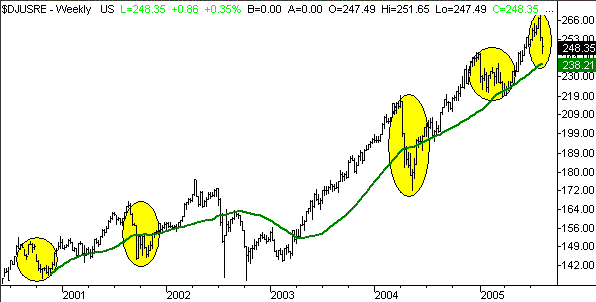We usually try to not jump on the bandwagon in terms of topics we discuss here. We figure that once an idea gains a little momentum in the media, it perpetuates itself. So, why bother going over it here? The only exception might be when we take our contrarian point of view, and disagree with the majority. Today we'll do just that....sort of. What we really want to do is make sure everyone understands what's going on with real estate right now, and why your real estate reality may not be affected by someone else's.
Setting the Stage
The reason we're even looking at real estate right now is that it's a hot topic again. Real estate investments have been red hot (until last week) since March, and they've actually been red hot since early 2003. Now, two years after the fact, a lot of folks are looking backwards, and wondering if the next two years are going to be just as good. On the other side of the coin is the argument that as rates go up, real estate will be less and less affordable. That will weaken demand, which will increase supply, and all of a sudden real estate prices are headed lower. The interest rate worry is logical & legitimate, although it may be historically unfounded. These folks are a little guilty of preaching gloom and doom, and warning of real estate disasters that are the result of a major real estate bubble. We'll listen to their case, but we'll also caution you that the 'bubble' is all relative.
The other thing we want to illustrate is that 'real estate' is actually an ambiguous term. That can mean your personal dwelling, strip malls, rental property, raw land, or it can mean REITs and other exchange-traded securities. Some are liquid, some produce income, and some are lousy ideas altogether. But don't lump all real estate into the same pot.
Real Estate as an Investment - How It Trades
For the time being, forget about real estate as a property owner - let's just look at things from a real estate investors point of view. These holdings are primarily REITS (Real Estate Investment Trusts). It's an interesting group, in that it actually trades wildly, but predictably. Take a look at the chart below of the Dow Jones Real Estate Index (DJUSRE). Over the long-haul, real estate stocks have actually been a very solid investment, with the exception of 2002. The typical chart action here is two steps forward and one step back. The two forward steps last for several months. The one step back lasts about two months. Those backward steps are all highlighted on the chart. They all feel the same.....they come out of nowhere, start off with a huge tumble, and then dwindle for a few more weeks. But each one was followed up with an even bigger gain. The consistency with which this pattern has emerged is impressive enough to us to consider buying REITs at what looks like a bottom (but we're not quite there yet).
Dow Jones Real Estate Index - Weekly

Owning REITs Is NOT the Same as Owning Property
Don't confuse a collapse in the housing market with a collapse in the value of REITs - they aren't the same. Property ownership is risky, and often illiquid. Demand for property truly is subject to interest rate fluctuations. However, there are a couple of things to keep in mind. First, interest rates have to be really high to stifle demand. Even after the Fed's rate increase on Wednesday, mortgage rates are still overwhelmingly low. The last time you could say that a real estate bubble burst was in the late 90's...but that was when mortgage rates (on a 30-year loan) were almost 2 percentage points higher then than they are now. Yes, rates are creeping higher, and that could potentially be a problem. However, the hype and hysteria seems to driven more by the mortgage lenders looking to drum up business, and less by economists with nothing to gain from that panic. That's not to say that your home's value is safe right now - the real estate market could fall apart tomorrow. If it does, though, it's not because interest rates are alarmingly high. (We'll have a special commentary next week about why you should be worried about property values.)
REITs, on the other hand, aren't hammered by higher interest rates. In fact, they may be a beneficiary from them. Most REITs derive income from rental income.....like apartment buildings, malls and shopping centers, and office buildings. When interest rates are low, a person or company can justify buying property as opposed to renting. When interest rates are high, it's easier to rent than it is to finance a purchase. In other words, higher interest rates increases demand for rental, which puts the REIT managers in the driver seat......they can charge higher rent.
Even within the REIT universe, though, it pays to know exactly what you have. Most REITs are designed to pass though rental income. BUT, some REITs are designed to take advantage of refinances, or through lending. That type of real estate investment could suffer from higher rates. Some REITs are even designed to generate revenue by developing raw land. The point is, don't lump REITs in with your actual property holdings. In fact, don't even lump REITs in with other REITs.
Bottom Line(s)
1) Don't get rattled by the "bubble" talk. These guys were wrong several times in the last few years.
2) Don't assume this dip in REITs is out of the ordinary. If anything, it's a buying opportunity (see the chart above)
3) Don't avoid all REITs just because they have the words "real estate" in them.
Price Headley is the founder and chief analyst of BigTrends.com.